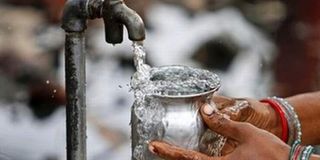Karatu benefits from pre-paid water scheme

What you need to know:
Tech-savvy water users in Karatu are now making use of emerging electronic water machine, a copycat of Automated Teller Machine (ATM) to monitor and control water more efficiently, thanks to a Sh700 million project executed by the Catholic Relief Service (CRS) under financial support from the UK Aid through Human Development Innovation Fund (HDIF).
Karatu. A new breed of technology that guarantees proper utilisation of precious, but scarce water resource, is emerging in Karatu district, promising a brighter future for water users in the country.
Tech-savvy water users in Karatu are now making use of emerging electronic water machine, a copycat of Automated Teller Machine (ATM) to monitor and control water more efficiently, thanks to a Sh700 million project executed by the Catholic Relief Service (CRS) under financial support from the UK Aid through Human Development Innovation Fund (HDIF).
Dubbed Revolutionising Remittance Recovery in Water (R3W), the project was handed over to two Community Owned Water Supply Organisations (Cowsos) in Karatu over the The two water schemes equipped with prepaid systems are benefiting over 12,000 people of various localities in Karatu, who did not have access to reliable water due to unsustainable water supply before this project whose implementation started three years ago. With the prepaid innovation, CRS was determined to provide solution by addressing issues around water revenues collection, use and management, and effectiveness of water utilities in responding to technical challenges that faced their water supply schemes.
R3W project manager Ephraim Tonya said the project was implemented in Qaru village under Endamarariek/Endabash Water Supply (Endawasu) community owned water supply organisations and four streets (Mjini Kati, Mazingira Bora, Bomani and Sabato).
CRS and its partners constructed 13 kilometres of piped water supply scheme, developed two deep boreholes, installed two solar pumping stations, built 20 water kiosks that were installed with AQ tap prepaid solar powered water dispensers and built two large storage tanks (22,500 litres and 45,000 litres each).
This integrated prepaid system offers a closed system and a revenue stream that make these utilities have funds in advance and efficiently attend the technical challenges facing their schemes.
Mr Tonya said that the execution was smoothened by community contribution in manpower especially in trenches excavations and back filling, construction materials mobilisation and great role in leading community awareness and protecting the project infrastructures.
HDIF progamme manager Eric Massinda commended the project partners for implementing and training water users in rural areas to understand and embrace the new technology smoothly.
“HDIF is grateful to hear that the R3W enables the water schemes to collect revenues by 200 per cent, our expectation is that the funds would be used to expand the scope of the project” Mr Massinda noted.
HDIF is keen on catalysing innovations that contribute towards alleviating challenges that impede human development, water shortage being one of them.
Funding CRS to implement this project is part of HDIF’s mandate to enhance innovations that can be adapted and replicated by other development practitioners.
“We thank CRS who trained and signed a contract with the local service provider within the project area to assist us in case of major technical challenges,” said Fabiano Qadwe, the ENDAWASU manager in Karatu.




